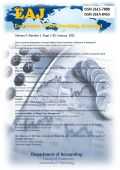The Evaluation of Accounting And Taxation Training
DOI:
https://doi.org/10.32493/eaj.v4i3.y2021.p179-194Keywords:
Evaluation, Training, Accounting, TaxationAbstract
The Accounting and Taxation training that has been provided is expected to provide education to these students. Accounting and taxation are important subjects for them because some of these students attend SMK majoring in Accounting. The training includes an introduction to accounting such as making journals and other bookkeeping, as well as tax training including an introduction to the types of taxes and how to calculate taxes and report tax obligations. The purpose of this study was to describe the participants' satisfaction with (1) evaluation of the training on the level of satisfaction of participants (X1), (2) the level of graduation of the trainees (X2), (3) changes in the behaviour of participants after the training (X3). This research is quantitative descriptive research with a survey method. Measuring the level of satisfaction of participants using a 5-scale questionnaire with respondents totalling 67 participants in accounting and taxation training at the Nurul Ihsan Islamic Boarding School, Tangerang Selatan Banten. The analysis tool uses descriptive. The results of this study indicate that accounting and taxation training has an influence on the development of knowledge and value of accounting and tax reports for students who attend SMK majoring in Accounting.
References
A.S.S, E. (2016). Specializing Information Analysis, Data and Reforts. Scientific Management and Business Management, 1(Directorate General of Taxes), PP.789-798.
D.Ramdani, B. (2017). Taxation Training and Consultation in the College of Economics. STIE Ekuitas Bandung. Equity Bandung, 01 N0.02, PP.14-17.
Ghozali, I. (2018). Multivariate Analysis Application with IBM Programs. SPPS 25 Edition Nine. Diponegoro University Publishing Agency.
Irawati, W., Atmaja, S. N. C. W., Asmilia, N., Oktaviana, R., & Sugiyarti, L. (2019). Basic Tax Training to Improve Compliance of Fish Farmer Taxpayers in Jampang Village, Bogor [Pelatihan Dasar Perpajakan Untuk Meningkatkan Kepatuhan Wajib Pajak pada Petani Ikan Desa Jampang, Bogor]. Proceeding of Community Development, 2, 588-594.
L.Listiorini. (2018). The Effect of Educational Levels and Accounting Training on the Use of Accounting Information in MSME Business Partners Fostered by Bank Sumut Medan. J.Act. and Business J.Program Studi Accounting, 4 Nomor 1.
N.Nuraini. (2018). Participants Level of Service Quality for Widyaiswara in Substantive Technical Training of Scientific Publications for Teachers of Religious Subjects at MTs Batch III. Androgogy I, Education and Training of Educators and Religious Engineering., 6 Nomor 1., PP.168-186.
Ningrum., N. P. (2019). Simple Bookkeeping Training, Socialization of Taxation and Management for MSMES Catering Mothers in Jatimulya Housing RW.012. J.Abdimas Ubi, 02 N0.02, PP.126-130.
S.H.B. Susetyo, S. (2020). Training Accounting for Fixed Assets at the 'NH' Islamic Boarding School, West Lombok Regency. J.PERPADU, 1 Number 1, 42-46.
S.Sulaefi. (2017). The Effect of Training and Development on Work Discipline and Employee Performance. J.Manaj.Entrepreneurship., 5 No.1.
Sugiyono. (2018). Research Methods (Quantitative, Qualitative, and R&D). Alphabeta Bandung.
Viktor Handrianus Pranatawijaya, W. (2019, November). Web-Based Survey Questionnaire Application Development Using Likert and Guttman Scales. Journal of Science and Informatics, 5, Number 2.
W.I.Zai. (2018). Stages of the Implementation Process of the Education and Training Program Evaluation Activities.
Y.Nurhayati. (2018). Application of the Kirkpatrick Model for Evaluation of Substantive Technical Training Programs for Learning Planing Materials in the Riau Islands Province Work Area. Androgogy J.Education and Training Techniques for Educators and Religion., 170-187.
Published
Issue
Section
License
Copyright (c) 2024 Sri Agustini, Muliyani Muliyani, Widiyanti Rahayu Budi Astuti, Wiwit Irawati

This work is licensed under a Creative Commons Attribution-NonCommercial-ShareAlike 4.0 International License.
Authors who publish with this journal agree to the following terms:
- Authors retain copyright and grant the journal right of first publication with the work simultaneously licensed under a Creative Commons Attribution License that allows others to share the work with an acknowledgement of the work's authorship and initial publication in this journal.
- Authors are able to enter into separate, additional contractual arrangements for the non-exclusive distribution of the journal's published version of the work (e.g., post it to an institutional repository or publish it in a book), with an acknowledgement of its initial publication in this journal.
- Authors are permitted and encouraged to post their work online (e.g., in institutional repositories or on their website) prior to and during the submission process, as it can lead to productive exchanges, as well as earlier and greater citation of published work (See The Effect of Open Access).

This work is licensed under a Creative Commons Attribution-ShareAlike 4.0 International License.


